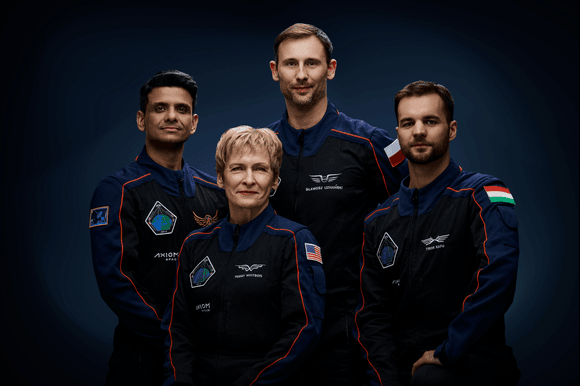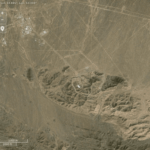Celebrations erupted across India as the Axiom-4 (Ax-4) space mission successfully launched with a multinational crew, marking a significant milestone for the country’s space ambitions. Among the crew is Indian Air Force officer Group Captain Shubhanshu Shukla, who has become only the second Indian to travel to space and the first to visit NASA’s International Space Station (ISS).
Group Captain Shukla is piloting the mission aboard the Ax-4, and in just over 26 hours—when the spacecraft docks at the ISS—he will officially become the first Indian astronaut to set foot on the orbiting space laboratory. His journey comes more than four decades after India’s first astronaut, cosmonaut Rakesh Sharma, traveled to space in 1984 aboard a Russian Soyuz spacecraft.
The Ax-4 mission, launched at 02:31 EDT (06:31 GMT; 12:01 IST) on Wednesday from NASA’s Kennedy Space Center in Florida, is being led by veteran American astronaut Peggy Whitson, a former NASA commander with over 675 days in space and ten spacewalks to her name. The flight marks a joint effort between NASA, India’s space agency ISRO, the European Space Agency (ESA), and SpaceX, and is being operated commercially by Houston-based Axiom Space.
The mission’s four-member team includes astronauts from three different countries: Group Captain Shukla of India, Slawosz Uznanski-Wisniewski of Poland, and Tibor Kapu of Hungary, alongside mission commander Whitson. For both Poland and Hungary, the flight marks a return to space after more than 40 years. All crew members underwent weeks of quarantine before the successful launch.
The mission has generated immense excitement in India, where ISRO highlighted the importance of Group Captain Shukla’s participation, stating that the experience he gains on the ISS will play a crucial role in advancing India’s human spaceflight capabilities. The 39-year-old officer was among four Indian Air Force pilots shortlisted last year for Gaganyaan, India’s first crewed spaceflight mission planned for 2027.
India’s ambitions for space exploration continue to grow, with the government announcing plans to establish a national space station by 2035 and to send astronauts to the Moon by 2040. To facilitate Group Captain Shukla’s participation in the Ax-4 mission and his intensive training, ISRO paid ₹5 billion (approximately $59 million or £43 million).
Moments after liftoff aboard the SpaceX Crew Dragon capsule, launched atop a Falcon 9 rocket, Shukla addressed the Indian public with a stirring message.
“We’re back in space after 41 years and what an amazing ride it’s been,” he said. “Right now, we are orbiting Earth at a speed of 7.5 km per second. On my shoulder, I carry the Indian flag. This is not the start of my journey to the ISS—this is the beginning of India’s human spaceflight. I welcome all my fellow Indians to be a part of this journey and feel proud and excited.”
The launch was broadcast live by both Axiom Space and NASA, and was widely watched across India, triggering widespread jubilation. Prime Minister Narendra Modi congratulated Group Captain Shukla on the successful launch, stating that the astronaut “carries with him the wishes, hopes and aspirations of 1.4 billion Indians.”
In Shukla’s hometown of Lucknow, his parents joined hundreds of schoolchildren to witness the historic launch. Upon arriving at a local school, they were greeted by a music band and applause, erupting into celebration as the rocket soared into the sky.
Born on 10 October 1985 in Lucknow, Shubhanshu Shukla joined the Indian Air Force in 2006 and has served as a fighter pilot, logging over 2,000 flight hours in various aircraft including MiGs, Sukhois, Jaguars, Dorniers, and Hawks. Speaking at a recent online press conference, he described the past year as “nothing short of transformative.”
“It has been an amazing journey so far, but the best is yet to come,” he said. “As I go into space, I carry not just instruments and equipment—I carry the hopes and dreams of a billion hearts. I request all Indians to pray for the success of our mission.”
During the two-week Ax-4 mission, Group Captain Shukla will be engaged in a rigorous schedule of scientific activities aboard the ISS. ISRO has announced that, in addition to his duties as pilot, he will participate in multiple public engagement events, including live interactions with Indian students and a potential conversation with Prime Minister Modi from space.
The crew will conduct 60 scientific experiments during their time on the ISS, including seven submitted by Indian researchers. Former NASA scientist Mila Mitra explained that the ISRO-backed experiments aim to improve our understanding of how space conditions affect biological systems and microgravity responses.
Key experiments include studying the effects of spaceflight on six types of crop seeds, and growing three strains of microalgae that may have future uses as food, fuel, or life-support systems. These experiments are designed to identify the most viable organisms for growth in microgravity.
Other ISRO experiments will explore how tardigrades—microscopic animals known for their extreme resilience—cope in space conditions, while further studies will examine the causes and treatment of muscle loss in microgravity, and assess the physical and cognitive effects of prolonged screen exposure in space environments.
As India watches with anticipation and pride, Group Captain Shukla’s mission is being hailed not only as a scientific endeavor but as a symbol of the country’s expanding role in global space exploration.






